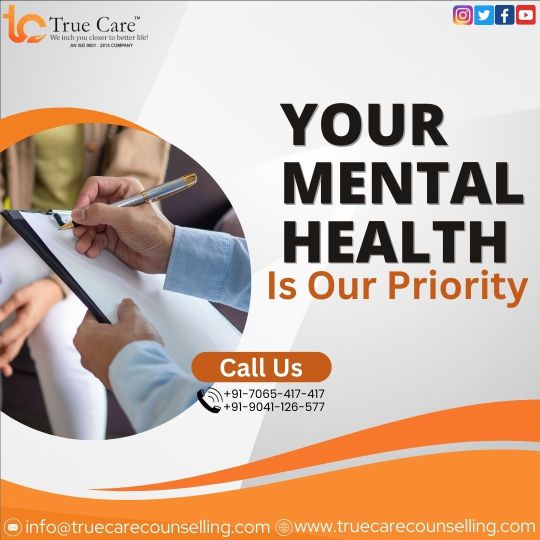Don't wanna be here? Send us removal request.
Text
Anxiety Disorder Assessment and Counselling Techniques
Anxiety may look like a catch-all already existing in mental health communication. The challenge is that signs of anxiety (worry, stress) are a normal role of daily existence. Anxiety is like an alarm bell that supports us in paying attention to circumstances that might set us in mental or physical danger.
If worry and tension are normal human reactions to existence, how do you know if your emotions might be arranged according to some classification system as anxiety?
Emotions of fear, worry, and anxiety can distinguish anxiety. If these emotions are happening to a stretch, we begin to ignore daily life circumstances because we always expect future concerns to be more severe. A generalized anxiety disorder is characterized by an important disturbance to someone’s day-to-day life for an extended point of time—strong emotion most days for at minimum seven months.
Symptoms of Anxiety Disorder
Symptoms of an anxiety disorder include common emotions of nervousness, difficulty focusing, and often tiredness. These symptoms are the results of anxiety drama as that “alarm bell”—persons go into a brawl, flight, or freeze manner when they sense a hazard. When we are in a state of discerned danger continually, it wears downward on our energy extent, and we run out of cognitive and physical power to manage.
Other symptoms of anxiety include:
Immoderate and ongoing stress
Constantly emotional like you are completely unquestionable something will go wrong.
Sleep disturbance
Chronic muscle tension or other physical outrage (shaking)
Life avoidance or common daily routine disturbance
Over-preparing and needing continuous reassurance
Assessment
A counsellor commonly begins by asking various questions to recognize present and in-progress signs of anxiety.
They may ask questions about your past, your early years, and recent existence events to decide if your signs are tied to particular traumas. They will see other relationships, such as family mental health past, matter use or abuse, physical injury or medical situations, or other lifestyle habits that may contribute to present days and ongoing emotions of anxiety.
There are many kinds of anxiety disorders, so these pieces of evidence will support the counsellor in deciding if you are suffering from a generalized anxiety disorder, social anxiety, health anxiety, stress, or others.
Periodically Anxiety is a Common Part of Life
You might feel worried when faced with an issue at work before taking a test or making an essential decision. But anxiety disorders involve more than non-permanent being anxious or fearful. For an individual with an anxiety disorder, the anxiety does not go away and can get difficult over time. Emotions can be involved in everyday activities such as job showing, school work, and connections.
Generalized Anxiety Disorder
People with generalized anxiety disorder display immoderate anxiety or worry for months and face many anxiety-related signs.
Generalized anxiety disorder signs include:
Restlessness or emotion wound up or on the fringe
Being easily exhaust
Difficulty focusing or having their minds go empty
Irritability
Muscle tightness
Dissimilar controlling the tension
Sleep issues
Essential things to know about getting therapy for anxiety include:
There are lots of experts to support you with anxiety
There are also many kind of anxiety therapy for anxiety, and you can get breater
You require a thorough check from a health experts before tharepy is advised
Many person who have had anxiety have been able to search for support and live active, satisfied lives.
True Care Counsellig has a multidisciplinary team of skilled anxiety counselling services in Noida and Panchkula. Anxiety disorders are mental health situations treated successfully with psychotherapy in mild structure and treated best with medications and psychotherapy in average to serious structure.
0 notes
Text
Faith and Forgiveness: Reconstruct trust and the ability of forgiveness in relationships.
Forgiving people is an important step that can let us go from negative feelings and allow us to move ahead. It can support us in letting go of bitterness and dissatisfaction and generate space for relief and development.

Forgiveness can also bring a feeling of calmness and closure, permitting us to focus on the present instant and the positive features of our existence. Forgiving people can have a major effect on our well-being and the standard of our connections.
Why is Forgiveness Essential for You?
Promotes Relieve: Forgiving people can support us to make well intensely and move on from past damages. When we grasp onto annoyance, bitterness, and other dismissive feelings toward others, it can lead to tension, worry, or even physical well-being issues.
Promotes Growth: When we select to forgive, it need us to challenge our feelings and worth. It can support us and guide us from our past undergo. It can give an opportunity for sending back and self-analysis, guiding to greater thoughts and individual growth.
Creates a Sense of Shutdown: Belongings to annoyance and bitterness can generate a cycle of dismissive feelings that can be a struggle to separate. Forgiveness can give a sense of alleviation or closing down to hurting or disturbing undergo. It can support us in moving on from the early and focusing on the current and time to come, permitting us to live more completely in the current moment.
Why is Forgiveness Essential for Relationships?
Forgiveness is important in any connection because it plays a critical part in settling disputes and replacing melodiousness. By forgiving whoever, we let go of the bitterness, anger, and damage that can cause toxic relationships. This generates extent for relief and reunion, allowing us to move ahead with revived faith and closeness.
Resolving Disputes: Forgiveness is essential for solving disputes between persons because it permits us to let go of the negative feelings that can lengthen or increase the dispute. When we grasp anger, bitterness, or an instinct for recrimination, we generate a hurdle to communication and grasp, making it more difficult to find an intention.
Structure Trust: Forgiveness is essential for structure trust between persons because it displays a readiness to let go of past problems and move ahead with a revived sense of esteem and grasp. When we forgive whoever, we appear that we are ready to give them a second possibility, to work toward trusting them again, and we are ready to continue going after a more helpful relationship.
Strengthening the Connection: Forgiveness is essential for building up the connection between persons because it permits us to restore the damage caused by painful steps or words, which can generate an extensive sense of relationship and closeness in our connections. When we forgive whoever, we are selecting to let go of the before and move ahead with a revived sense of desire and hopefulness.
Promoting Developing: Forgiveness can encourage individual development by heartening individuals to go back on their steps and take authority for their faults. It can also support individuals' growth, greater flexibility and managing abilities.
Improving Communication: Forgiveness can make better communication between couples therapy, which will help to encourage frankness, loyalty, and harm. It can generate a secure space for both partners to communicate their emotions and requires without panic of discernment or refusal. It permits the resolution of disputes, encourages understanding, decreases stress and negative feelings, and constructs trust. It authorizes both partners to move past disputes and centre on finding a mixture with each other.
Finding Support from counselling to Forgive and Let Go of Hurt
A mental health expert, such as a therapist or counsellor, can support a person in inspecting their emotions of pain and anger and developing managing techniques for dealing with those feelings. Relationship Counselling services in Noida can also give a secure environment for the person to transmit themselves and work through the procedure of pardon at their footstep.
0 notes
Text
Anxiety Therapy: Understanding Successful Solutions
Anxiety is a regular and natural human reaction that can from time to time become enormous affecting our thoughts, feelings, and behaviors. It’s that shaking of anxiety before a big event or the caution about a loved one’s well-being.

Although, for some, anxiety takes on a life of its own, foremost to purposeful worry, panic attacks, and avoidance of certain circumstances. Understanding and coping with stress is important for continuing a healthy and equitable life.
At True Care Counselling, we understand that anxiety counselling services in Noida can be obvious in numerous ways, and impact your feelings well-being and daily performance. Our team of skilled and dedicated counsellors are here to attendant you between evidence-based techniques and personalized proceed, authorizing you to navigate challenges, develop flexibility, and experience a greater sense of calm and belief.
Symptoms
Regular anxiety signs and symptoms include:
Feeling nervous, restless or tense
Having a feeling of approaching danger, panic or downfall
Having an enlarged heart rate
Breathing rapidly
Sweating
Weakness
Feeling weak or tired
Trouble focusing or thinking about anything other than the current worry
Having problems sleeping
Experiencing gastrointestinal
Having difficulty managing worry
Having the desire to avoid things that activate anxiety
How can you support someone with anxiety?
If you’re not a therapist or counsellor yourself, it may not be clear how to best proceed towards a friend or loved one you have a suspicion is living with an anxiety disorder. These six proposals are a good beginning point.
Learn the symptoms and signs of anxiety: Anxiety can feel greatly disconnected, and you shouldn’t presume that a companion or loved one will impulsively open up to you about what they’re experiencing. Alternatively, it’s useful to know the signs of an anxiety disorder, such as generalized anxiety disorder or social anxiety disorder, so that you can be aware of anyone in your life who might be distressed in silence.
Make them comfortable: Whether or not your friend resolves to open up to you about what they’re experiencing, it’s essential to sign to them that they are secure to do so with you. Describe that they can share their emotions, feelings and thoughts without being afraid of discernment or refusal.
You can also make sure that discussions with your friend are diversion-free, and that your body language is open and welcoming—for instance, ignore being on your phone, and make eye contact and incline when suitable.
Listen to their feelings: If your loved one does choose to share, it’s essential to hear with empathy and prove their experiences when they communicate themselves to you. This will not only support your loved one to feel less solo, but it will also help you accept what they’re going through and what kind of support could most advantage them.
Express your concern: It’s OK to tell your loved one that you’re anxious about their welfare. Sometimes having an outside outlook can make all the dissimilarity, particularly when it comes to searching for support for mental health circumstances. Let them know the purpose of why you’re worried —what behaviors and steps you may have noticed.
Know what not to do: Anxiety disorders cannot be healed with determination; they are healed by mental health circumstances. Inspiring someone with difficulties with their mental health to “get over it” can activate emotions of shame and negative concept patterns, and may prevent them from searching for support.
Recommend they speak to a professional: Anxiety disorders cannot be self-determine, nor can they be identified by anxious friends or loved ones. Anxiety disorders can only be identified by mental health experts.
0 notes
Text
5 lifestyle changes that may assist with managing anxiety
Anxiety
Anxiety is an uneasy fear or stress that terrible things may occur. It can originate physical signs such as trembling, shaking, muscle pains, uneasiness, insomnia, fast heartbeat, sweating, and sweaty hands.
Anxiety disorder
We all have moments of apprehension and not uncomfortable fears. Still, when those emotions start to become utmost or get involved in everyday life, you might be diagnosed with an anxiety disorder, a mental illness.

Anxiety disorders can be handled with medication, such as anti-anxiety medicine, and skilled anxiety therapy.
There are some kinds of anxiety disorders, but two of the most normal are:
Generalized anxiety disorder: This includes several months of in-progress physical symptoms that happen along with anxiety.
Panic disorders: Panic disordersinvolve repeated episodes of unexpected fear, feelings of danger or upcoming end, and physical symptoms.
Lifestyle changes, such as a better sleep routine, increasing social hold up, using stress-bringing low abilities, and getting daily exercise, also may support. Be calm; it may take some time before these changes affect your anxiety.
If you are fighting with anxiety or depression, a good beginning point may be to think about how your lifestyle options may play a part in your mental health. While changing this routine may not behave towards a mental health disorder, it may be essential for handling your symptoms.
1. Prioritize sleep:
Keep away from screen time at least one hour before bed. Make your bedroom sleep-friendly by keeping it cool, dark, and silent. Follow the advice on proper exercise to improve overall health and your sleep. The goal is to do at least twenty minutes of exercise a day.
2. Stay active and focus and go outside
Exercise is better for anxiety, and social anxiety therapy is worth it, too. But it's even better if you do it on the outer side, balanced to inside a gym. Sunlight assists in keeping your serotonin volume up. This supports and raises your energy and keeps your mood calm, positive, and concentrated.
3. Focus on good nutrition
When we do not feel good about our nutrition, the best way to change it is to make a regular plan. “Go through a few minutes thinking about healthy snacks, and prepare them in advance. Then, when you’re too hungry to plan of action, you’ll have healthful and balanced snacks that are all set to go.”
One of the easiest ways to improve your diet and state of mind is to drink more water. Even lenient dehydration can affect our moods. The next time you need to reach for a quick snack, suggest drinking a cup of water first.
4. Avoid or control alcohol and other substances
Alcohol changes volumes of serotonin and other neurotransmitters in the brain, which can make anxiety worse. You may feel more worried after the alcohol is put on. Alcohol-convince pressure can last for hours or even an entire day after drinking.
5. Practice meditation
To use this, take heavy breaths and name five objects you can see nearby, four things you can connect to, three you can listen to, two you can smell, and one you can savor. By practicing engaging with our feelings, we can keep on the ground more in the current moment.
What Lifestyle Changes are Recommended for Anxiety?
Lifestyle changes are simple but strong tools in behavior toward anxiety, and they are an essential element of a desegregate approach to therapy. In a few cases, lifestyle changes can assist depression or reduce stress, so it makes feeling to start with them right aside. But if you suffer from average to severe anxiety, seek professional support immediately. And if you don’t see calmness from symptoms of lenient depression in a few months, likewise search for anxiety counselling services in Noida.
1 note
·
View note